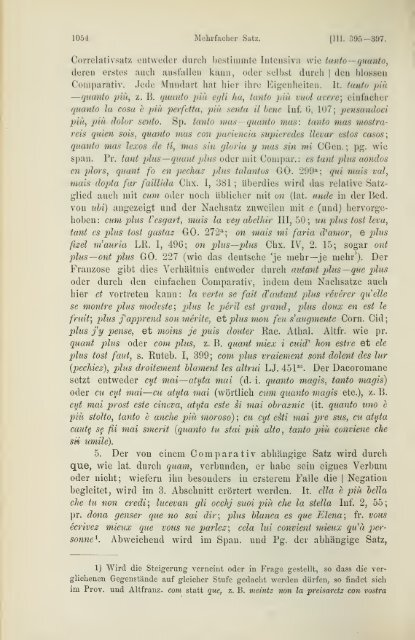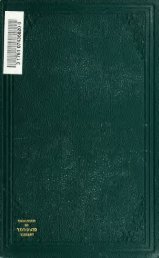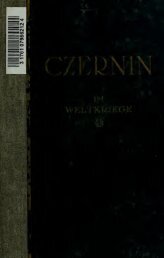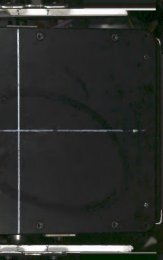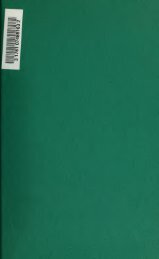- Seite 1:
. CO I f. svw 7 _uo 1 " *t IfcJ -^
- Seite 7 und 8:
III. 3. 4.] 763 Viertes B u c b. Sy
- Seite 9 und 10:
welche III. 5—7.] Substantiv und
- Seite 11 und 12:
dieses III. 8. 91 Substantiv und Ad
- Seite 13 und 14:
darum III. 11. 12.] Substantiv und
- Seite 15 und 16:
die III. 13— 15.] Substantiv und
- Seite 17 und 18:
III. IG. 17.] Substantiv und Adject
- Seite 19 und 20:
III. 19. 20.) Artikel. 775 tikels,
- Seite 21 und 22:
Sinn. I. III. 21-23.] Artikel. 777
- Seite 23 und 24:
im III. 24. 25.] Artikel. 779 setze
- Seite 25 und 26:
: III. 27. 28.] Artikel. 781 taigne
- Seite 27 und 28:
mit III. 29—31 ] Artikel. 783 Fed
- Seite 29 und 30:
fordert in. 32. 33.] Artikel. 785 A
- Seite 31 und 32:
III. 35. 36.] Artikel. 787 Stil üb
- Seite 33 und 34:
giudicio III. 37—39.] Artikel. 78
- Seite 35 und 36:
alle Medius III. 40—42.] Artikel.
- Seite 37 und 38:
otro. III. 43. 44.1 Artikel. 793
- Seite 39 und 40:
Gebrauch III. 46. 47.] Pronomen. 79
- Seite 41 und 42:
III. 49. 50.] Pronomen, persönlich
- Seite 43 und 44:
| : III. 51. 52.] Pronomen, persön
- Seite 45 und 46:
; III. 54. 55.] Pronomen, persönli
- Seite 47 und 48:
in genommene III. 56— 58] Pronome
- Seite 49 und 50:
durch III. 59. CO.] Pronomen, pers
- Seite 51 und 52:
III. 62. 63.] Pronomen, juTsönlirl
- Seite 53 und 54:
wird (hängt III. 64— GG.] Pronom
- Seite 55 und 56:
III. 7— 69.] Pronomen, possessive
- Seite 57 und 58:
III. 70. 71.] Pronomen, possessives
- Seite 59 und 60:
durchaus. III. 73. 74.] Pronomen, p
- Seite 61 und 62:
III. 75— 77.] Pronomen, demonstra
- Seite 63 und 64:
; III. 78. 79.] Pronomen, demonstra
- Seite 65 und 66:
Pg. III. 81. 82.J Pronomen, interro
- Seite 67 und 68:
scheint III. 83—85.] Pronomen, un
- Seite 69 und 70:
nuevo III. 86. 87.] Pronomen, unbes
- Seite 71 und 72:
III. 89. 90.] Pronomen. Talis. Quic
- Seite 73 und 74:
(poie pg. III. 91—93.] Genus und
- Seite 75 und 76:
III. 94. 95.] Genus und Numerus des
- Seite 77 und 78:
fähig III. 97. 98.] Casus. Nominat
- Seite 79 und 80:
er ;: III. 100. 101.] Casus. Accusa
- Seite 81 und 82:
e III. 102—104.] Casus. Accusativ
- Seite 83 und 84:
che III. 105. 106.] Casus. Accusati
- Seite 85 und 86:
| III. 108. 109.] Casus. Aceusativ
- Seite 87 und 88:
; III. 110— 112.] Casus. Accusati
- Seite 89 und 90:
; III. 113. 114] Casus. Accusativ b
- Seite 91 und 92:
III. 116. 117.] Casus. Accusativ, d
- Seite 93 und 94:
2) III. 118—120.] Casus. Accusati
- Seite 95 und 96:
sie III. 121. 122.] Casus. Accus;it
- Seite 97 und 98:
(dass) III. 124. 125.] Casus. Accus
- Seite 99 und 100:
(ausculto seine III. 126—128.] Ca
- Seite 101 und 102:
III. 129. 180.] Casus. Dativ bei In
- Seite 103 und 104:
der ; III. 132. 133.] Casus. Dativ
- Seite 105 und 106:
dous Inf. III. 134—136.] ('usus.
- Seite 107 und 108:
amici, III. 137 — 139.] Casus. Da
- Seite 109 und 110:
licencia 19, lo ftlh sancta Maria C
- Seite 111 und 112:
Benennung. schwankt III. 142—144.
- Seite 113 und 114:
| theils III. 145—147.] Casus. Ge
- Seite 115 und 116:
molti III. 148—150.] Casus. Genit
- Seite 117 und 118:
III. 151. 152.] Casus. Genitiv beim
- Seite 119 und 120:
III. 154. 155.] Casus bei Präposit
- Seite 121 und 122:
in III. 156—158.] Casus bei Präp
- Seite 123 und 124:
III. 159. 160.] Casus bei Präposit
- Seite 125 und 126:
1 Ravenna III. 102. lf>3. Casus bei
- Seite 127 und 128:
Allein non III. 1G4— lf.fi.] Casu
- Seite 129 und 130:
da III. 167—169.] Casus hei Präp
- Seite 131 und 132:
vous ; III. 170. 171.] Casus bei Pr
- Seite 133 und 134:
(veniri plus quam trecentis denarii
- Seite 135 und 136:
pezzi III. 176. 177.] Casus bei Pr
- Seite 137 und 138:
me III. 178— ISO. Casu^ | bei Pr
- Seite 139 und 140:
längs, mich) : III. 181. 182.] Cas
- Seite 141 und 142:
III. 184. 185.] Casus bei Präp. Po
- Seite 143 und 144:
III. 187. 188.] Casus bei Präp. Su
- Seite 145 und 146:
hervorgebracht. qiton III. 189— 1
- Seite 147 und 148:
III. 192. 193.] Genus Verbi. Activu
- Seite 149 und 150:
deult, III. 195. 196.] Genus Vcrbi.
- Seite 151 und 152:
mir III. 197—199.] Genus Verbi. A
- Seite 153 und 154:
III. 200. 201.] Genus Verbi. Activu
- Seite 155 und 156:
hierbei Part. III. 202—204.] Genu
- Seite 157 und 158:
III. 20G. 207.] Genus Verbi. Passiv
- Seite 159 und 160:
potrebbesi III. 208—210.] Modus.
- Seite 161 und 162:
III. 211. 212.] Modus. Imperativ. 9
- Seite 163 und 164:
digats! 6894 K \ III. 214] Modus. I
- Seite 165 und 166:
III. 216—218.] Modus. Infinitiv.
- Seite 167:
afr. III. 210. 220.] Modus. Infinit
- Seite 170 und 171:
CLuc.; pg. 938 Einfacher Satz. | II
- Seite 172 und 173:
: 92R EinfaoheT Satz. (III. 22G. 22
- Seite 174 und 175:
fr. on le mene pendre; vgl. S. 913.
- Seite 176 und 177:
(ineipit 932 Einfacher Bäte. [III.
- Seite 178 und 179:
de 934 Einfacher Satz. 'III. 284 ve
- Seite 180 und 181:
936 Einfacher Satz. [III. 237. 238.
- Seite 182 und 183:
938 Einfacher Satz. [III. 940. 241.
- Seite 184 und 185:
!»4ü Einfaohi r Säte. III. 242
- Seite 186 und 187:
1 942 Einfacher Satz. [III. 245. 24
- Seite 188 und 189:
sp. mos 944 Einfacher Satz. [III. 2
- Seite 190 und 191:
946 Einfacher Satz. in verbis senti
- Seite 192 und 193:
''! Einfacher Satz. |I1I. 268. 264
- Seite 194 und 195:
D50 Einfacher Bäte. [III. 266. -'5
- Seite 196 und 197:
952 Einfacher Satz. |III. 269 280 h
- Seite 198 und 199:
Einfaoher Bäte [111. 201—263. de
- Seite 200 und 201:
sp. beredt, Einfacher Satz. [II I.
- Seite 202 und 203:
andre 968 Einfacher Satz |lll 267 S
- Seite 204 und 205:
1 960 Einfacher Satz. III. 209-271.
- Seite 206 und 207:
' 962 Einfacher Bat*. [III. 272. 27
- Seite 208 und 209:
aizo. Einfacher Satz. |III. 27'.. 2
- Seite 210 und 211:
Italia Einfacher Satz. |lll. 277 27
- Seite 212 und 213:
so Einfacher Satz. |III. 280. 281.
- Seite 214 und 215:
aus : 970 Einfacher Bat*. [in. 283.
- Seite 216 und 217:
' | Transitiven 97 Einfaoher Satz.
- Seite 218 und 219:
974 Kinfacher Satz. [III. 288—290
- Seite 220 und 221:
sich denken, und wenn man sagt es a
- Seite 222 und 223:
978 Einfacher Satz. [III. 294. 295.
- Seite 224 und 225:
darin von den Transitiven, dass ihr
- Seite 226 und 227:
; '.)-_• Einfach, r Satz. [III. 2
- Seite 228 und 229:
984 Einfacher Bäte. |III. 302 nach
- Seite 230 und 231:
home Einfacher Satz. [III. 304—30
- Seite 232 und 233:
ein 988 Einfacher Satz. [III. 307.
- Seite 234 und 235:
erklären 990 Einfacher Bats. Hl. 3
- Seite 236 und 237:
pg. buon 992 Einfadher Satz. [in. 3
- Seite 238 und 239:
994 Einfacher Satz. [III. 315. 310.
- Seite 240 und 241:
996 Einfaoher Satz. |lil Bia B19. g
- Seite 242 und 243:
Mehrfacher Satz. |III. 820—832. d
- Seite 244 und 245:
quid, 1000 Mehrfacher Satz. [III. 3
- Seite 246 und 247:
cstaba 1002 Mehrfacher Bat«. [III.
- Seite 248 und 249: Pr. loui Mehrfacher Satz. |II1. pos
- Seite 250 und 251: \ 100»; Mehrfacher Satz. III. BS1.
- Seite 252 und 253: 1008 Mehrfacher Satz. |III. 334. 33
- Seite 254 und 255: mi 1010 Mehrfacher Satz, III. 330
- Seite 256 und 257: Satze passent 1012 Mehrfacher Satz.
- Seite 258 und 259: vedervi lui i Mehrfadher Bäte, lll
- Seite 260 und 261: dimorare ; Ion; Mehrfacher Satz. (I
- Seite 262 und 263: veo, 1018 Mehrfacher Satz. |I1I. 84
- Seite 264 und 265: 1020 Mehrfacher Satz. [III. B50. 85
- Seite 266 und 267: 1022 Mehrfacher Bat*. [III. 3. r >8
- Seite 268 und 269: 118 1024 Mehrfacher Bat«. in. B65
- Seite 270 und 271: 1026 Mehrfaoher Bat«. |III. 358—
- Seite 272 und 273: Conj., 1028 Mehrfacher Satz. [III.
- Seite 274 und 275: 1030 Mehrfacher Satz. [III. 364. 36
- Seite 276 und 277: 1032 Mehrfacher Bat«. [III. 866. 8
- Seite 278 und 279: es 1034 Mehrfacher Satz. [III. B69.
- Seite 280 und 281: L086 Mehrfacher Bäte. [HL 872. 373
- Seite 282 und 283: 1038 Mehrfacher Sab. [III. 374—37
- Seite 284 und 285: afr. 1040 Mehrfacher Satz. [III. B7
- Seite 286 und 287: 1042 Mehrfacher Satz. |III. 380. 38
- Seite 288 und 289: wie sono 1044 Mehrfaefa III. :j82
- Seite 290 und 291: 1046 Mehrfacher Satz. [III. 386. 38
- Seite 292 und 293: 104R Mehrfacher Satz. [III. 388. 38
- Seite 294 und 295: 1060 Mehrfacher Satz. [III. 890. B9
- Seite 296 und 297: selui 1052 Mehrfacher Satz. [III. 3
- Seite 300 und 301: Heues; 1056 Mehrfacher Bat». [III.
- Seite 302 und 303: 1068 Mehrfacher Bat«. |1M. 401. 40
- Seite 304 und 305: Satzes LRs.; 1060 Rlehrftioher Satz
- Seite 306 und 307: auch 1062 Mehrfacher Bäte. |III L0
- Seite 308 und 309: 1(11,1 Mehrfacher Satz. |IIF. 409.
- Seite 310 und 311: in der speciellen Grammatik nachzus
- Seite 312 und 313: in Mehrfacher Satz. |III. 414—416
- Seite 314 und 315: wahrnehmen, 1070 Itehrfaoher Batz.
- Seite 316 und 317: cresco 1072 Negationamethode. [III.
- Seite 318 und 319: 1074 Negationsmethode [III. 422. 42
- Seite 320 und 321: 1076 Negationsmethode [III. 425. 42
- Seite 322 und 323: che 1078 v fationsmethode [III. 427
- Seite 324 und 325: werden 1080 Negationsmethode [III.
- Seite 326 und 327: naeido : 1082 Negationsmethode [III
- Seite 328 und 329: Sprachproben, L084 Negationsmethode
- Seite 330 und 331: einem nuls 1080 Negationsmethode |l
- Seite 332 und 333: 1088 Negationsmothode |III. 111. 44
- Seite 334 und 335: pas, ; 1090 Negationsmethode [III.
- Seite 336 und 337: Wohlgefallen 1092 Wortstellung. [II
- Seite 338 und 339: und 1094 Wortstellung. [III. 449. 4
- Seite 340 und 341: 1 1096 Wortstellung. |III. 151—45
- Seite 342 und 343: Petrul 1 1098 Wortstellung. [III. 4
- Seite 344 und 345: 1100 Wortstellung. (III. 457. 458.
- Seite 346 und 347: del 1102 Wortstellung. [III. 459—
- Seite 348 und 349:
d'etat . 1104 Wortstellung. [III. 4
- Seite 350 und 351:
1106 Wortstellung. [III. 465. 466.
- Seite 352 und 353:
ne : 1108 Wortstellung. [III. 468.
- Seite 354 und 355:
nos ;: lllo Wortstellung. [III. 470
- Seite 356 und 357:
; 1112 Wortstellung. [III. 473. 474
- Seite 358 und 359:
1 1114 Mehrfacher Satz. Anhang. [II
- Seite 360 und 361:
: 1116 Anhang. [III. 478—480. s'a
- Seite 362 und 363:
Register zum zweiten Buch. Italieni
- Seite 364 und 365:
! priendre 1120 Register zum 2. Buc
- Seite 366 und 367:
1122 Register zum dritten Bnch. Abl
- Seite 368 und 369:
1124 Register zum dritten Buche. ac
- Seite 370 und 371:
. ; ; 11 Uli Register zum 4. Buche.
- Seite 372 und 373:
; . 1128 Register zum 4. Buche. car
- Seite 374 und 375:
;; 1130 Register zum 4. Buche. faut
- Seite 376 und 377:
1 ; ; ; 1132 Register zum 4. Buche.
- Seite 378:
; 11:14 Register zum 4. Buche. supp
- Seite 382:
, Wv> vv l * • - | J «f :f»< i


